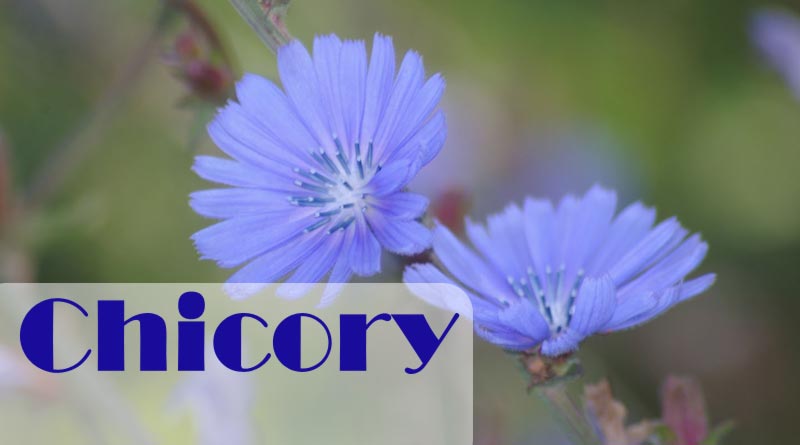Scientific name: Chicorium intybus
English name: Chicory
Family: Compositae
Chicory is a perennial herbaceous plant with 30- 150 cm height. The stem has longitudinal grooves and some latex. The root continues with thick short rhizomes. Chicory is a plant indigenous to Europe, India, and Egypt. It was introduced to the US in the late 19th century. It grows as a weed in temperate climates and is widely cultivated in northern Europe. There are 2 principal types: The Brunswick variety has deeply cut leaves and generally spreads horizontally; the Magdeburg variety has undivided leaves and grows erect. Chicory has bright blue flowers that bloom from July to September. The dried root is the primary part of the plant used “Chicory” is also the common name in the United States for curly endive (Cichorium endivia); these two closely related species are often confusing.
In terms of nutritive value, chicory is a great source of vitamins and minerals, including zinc, magnesium, manganese, calcium, iron, folic acid, and potassium, as well as vitamins A, B6, C, E, and K. These are the main agents behind all of the health benefits that come from chicory, which are explained below.
Chicory around the world
Chicory is a medicinally important plant in Eurasia and in parts of Africa. Despite its long tradition of use, the plant is not described in the European Pharmacopoeia or in any official Pharmacopoeia of a European Union member state. However, due to its prevalent distribution, different parts of the plant have been used in traditional medicines globally. Important phytochemicals are distributed throughout the plant, but the main contents are present in the root. This review focuses on the economic and culturally important medicinal uses of C. intybus. Traditional uses, scientific validation, and phytochemical composition are discussed in detail.
Historically, chicory was grown by the ancient Egyptians as a medicinal plant and it has had a long history of therapeutic use both in areas where it is indigenous and in areas where it has been introduced. The various common or local names describing this plant may be ascribed to the widespread use by different folkloric groups. Different preparations of this plant are employed to treat various symptoms and ailments . The juice is said to be a folk remedy for cancer of the uterus and for tumors . In South Africa, although it is considered a widespread weed, leaves, stems, and roots are made into a tea for jaundice and chicory syrup is used as a tonic and purifying medicine for infants. In Turkey, an ointment is made from the leaves for wound healing . Decoction refers to a preparation that is made by adding cold water to the plant material which is then boiled and allowed to simmer for 5–10 min after which it is strained . Chicory decoctions are traditionally made from individual plant parts and/or from the plant as a whole.
Chicory in Iranian traditional medicine
The fresh root is bitter, with a milky juice that is somewhat aperient and slightly sedative. A decoction of the root to a pint of boiling water, taken freely, is effective in jaundice, liver enlargements, gout and rheumatic complaints. A decoction of the plant, freshly gathered, is recommended for gravel. Syrup of Chicory is an excellent laxative for children, as it acts without irritation. An infusion of the herb is useful for skin eruptions connected with gout.
The old herbalists considered that the leaves when bruised made a good poultice for swellings, inflammations, and inflamed eyes. When chicory is taken too habitually, or freely, causes venous passive congestion in the digestive organs within the abdomen and fullness of blood in the head. If it is used in excess as medicine it can cause loss of visual power in the retina. A water was distilled from the flowers to allay inflammation of the eyes.
Active substances
The bitter substances are sesquiterpene lactones, lactucin and lactucopicrin. Other ingredients are aesculetin, aesculin, cichoriin, umbelliferone, scopoletin, 6,7-dihydrocoumarin, and further sesquiterpene lactones and their glycosides.
Pharmacological Activities
Cichorium intybus presents a little investigated plant in terms of phytochemistry and pharmacology. Over 100 individual compounds have been isolated and identified from this plant , the majority of which are from the roots. Most of the pharmacological studies on this plant document the testing of aqueous and/or alcoholic extracts only. It included many activities such as these mentioned cases:
- Antimicrobial Activity
- Anthelmintic Activity
- Antimalarial Activity
- Hepatoprotective Activity
- Antidiabetic Activity
- Gastroprotective Activity
- Anti-Inflammatory Activity
- Analgesic Activity
- Antioxidant Activity
- Tumor-Inhibitory Activity
- Antiallergic Activity
Also it can be used as a bile inducing, deurtic and febrifuge.
Medicinal Uses of Chichory
The medicinal properties of this plant were known to mankind since the ancient times.
- This herb is recommended for the health disorders like rheumatism, gallstones, appetite loss, gout, jaundice and problems related to the spleen.
- Compressed chicory leaves can be highly effective in swellings and skin irritations.
- Regular intake of the roots of the plant have resulted in evident decline of the symptoms of PMS or premenstrual syndrome, by maintaining hormonal balance in a woman’s body.
- Consuming this plant can actually boost the body’s ability to absorb vital nutrients like calcium that are essential for health.
- Folklore has it, that chichorium intybus can turn out to be an excellent laxative stimulating the evacuation of faeces, especially for children. Furthermore this herb was also believed to have properties that could eliminate fluid from our body, thereby providing relief from gout and rheumatism.
- Vegetable salads comprising of chicory leaves, maybe bitter in taste but can work wonders for your liver. In fact the herb has properties that can destroy intestinal parasites and hinder the growth of candida.
- Chicory also functions as an excellent blood purifier if taken regularly.
- The herbal tea produced from the leaves and roots of this plant can act as a remedy for appetite loss. Apart from being a great beverage, this tea could turn out to be a much required tea for your stomach.
- Chicory extract can help lower blood sugar levels.
Dosing
There is no recent published clinical evidence to guide dosage of chicory. Typical doses of the herb in classical use are 3 to 5 g/day.
Treatment in herbal medicine:
We have used Chicory for production of “Paprika liver cleanser” or “7plants of Paprika”. This production cleanse the blood and liver and heals mostly all problems related to liver as mentioned above. In production of this product many plants are involved, which are playing an important role in removal of waste materials from the blood and liver. This herbal medication is able to heal many diseases easily, such as hyperlipidemia , blood viscosity and weakness of liver. Also because of high ability in detoxification it is an effective treatment for the liver problems and diseases such as fatty liver. In addition, this extract has high amount of vitamin A,B and C and it is a good treatment for the liver problems like darkness of skin color in face and lips, other skin problems ,and jaundice.
References:
www.onlyfoods.net
www.hindawi.com
www.drugs.com
www.organicfacts.net
www.botanical.com
http://www.parsiteb.com
 Parsi Teb Physical and Mental Health Journal
Parsi Teb Physical and Mental Health Journal 



